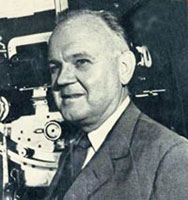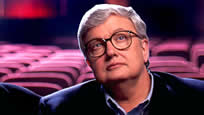Bosley Crowther and Roger Ebert
 Many of the reviews used in this class come from Bosley Crowther (1905-1981). Crowther worked for the New York Times for nearly 40 years and was the paper's film critic for the for 27 years, from 1940-1967. Crowther wanted to elevate both film and film criticism to art forms. He championed films that had strong social content and, more than any other person, he was probably responsible for the boom in foreign films in the US in the 1950s and 1960s (he particularly promoted Italian Neo-Realist filmmakers such as Roberto Rossellini and Vittorio De Sica. If you've heard of Ingmar Bergman and Federico Fellini, it's probably because of him). Crowther was a loud and prominent opponent of Joseph McCarthy and fought against Hollywood blacklisting. He was an advocate of social responsibility for the movies but also a strident opponent of censorship. Crowther lost his position at The Times after he blasted the 1967 blockbuster film Bonnie and Clyde as a "blending of farce with brutal killings as pointless as it is lacking in taste." Well he missed that one (B&C won two Oscars and is today on many lists of all time best films), but he got a lot of other stuff right. You may have trouble accessing Crowther reviews depending on your access to the New York Times website.
Many of the reviews used in this class come from Bosley Crowther (1905-1981). Crowther worked for the New York Times for nearly 40 years and was the paper's film critic for the for 27 years, from 1940-1967. Crowther wanted to elevate both film and film criticism to art forms. He championed films that had strong social content and, more than any other person, he was probably responsible for the boom in foreign films in the US in the 1950s and 1960s (he particularly promoted Italian Neo-Realist filmmakers such as Roberto Rossellini and Vittorio De Sica. If you've heard of Ingmar Bergman and Federico Fellini, it's probably because of him). Crowther was a loud and prominent opponent of Joseph McCarthy and fought against Hollywood blacklisting. He was an advocate of social responsibility for the movies but also a strident opponent of censorship. Crowther lost his position at The Times after he blasted the 1967 blockbuster film Bonnie and Clyde as a "blending of farce with brutal killings as pointless as it is lacking in taste." Well he missed that one (B&C won two Oscars and is today on many lists of all time best films), but he got a lot of other stuff right. You may have trouble accessing Crowther reviews depending on your access to the New York Times website.
 Even more of the reviews we use are by Roger Ebert (1942-2013). Ebert worked for the Chicago Sun Times for 46 years starting in 1967. From the early 1980s until his death, Ebert became, more than anyone else, the face of movie reviews in the US. Starting in 1982, he hosted a movie review television program, first with Gene Siskel, and, after Siskel's death in 1999, with Richard Roeper. Ebert was the first film critic to win a Pulitzer Prize. He was the author of numerous books as well as the screen play for the cult classic film Beyond the Valley of the Dolls and several other films. Ebert was himself the subject of a movie, based on his autobiographical book Life Itself. The 2014 film (same title as the book) has a 97% rating on Rotten Tomatoes, and you should see it if you haven't. Ebert became so popular because his reviews are both accessible and insightful. He was often very funny, and pretty much always good hearted. Part of his gift was not taking himself too seriously. Ebert also particularly promoted Asian film and films by African Americans. One of his better known reviews is his 1989 review of Spike Lee's Do the Right Thing. All of Ebert's reviews are easily accessible on his website, rogerebert.com which continues to publish new movie reviews from a good variety of reviewers.
Even more of the reviews we use are by Roger Ebert (1942-2013). Ebert worked for the Chicago Sun Times for 46 years starting in 1967. From the early 1980s until his death, Ebert became, more than anyone else, the face of movie reviews in the US. Starting in 1982, he hosted a movie review television program, first with Gene Siskel, and, after Siskel's death in 1999, with Richard Roeper. Ebert was the first film critic to win a Pulitzer Prize. He was the author of numerous books as well as the screen play for the cult classic film Beyond the Valley of the Dolls and several other films. Ebert was himself the subject of a movie, based on his autobiographical book Life Itself. The 2014 film (same title as the book) has a 97% rating on Rotten Tomatoes, and you should see it if you haven't. Ebert became so popular because his reviews are both accessible and insightful. He was often very funny, and pretty much always good hearted. Part of his gift was not taking himself too seriously. Ebert also particularly promoted Asian film and films by African Americans. One of his better known reviews is his 1989 review of Spike Lee's Do the Right Thing. All of Ebert's reviews are easily accessible on his website, rogerebert.com which continues to publish new movie reviews from a good variety of reviewers.